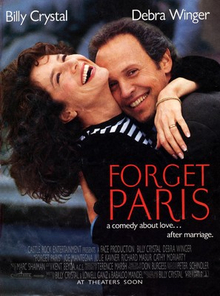Forget Paris: For Love

What is true love? In children's cartoons (particularly the Disney Princess series) the endings were almost always the same: the princess and the prince shared mutual feelings of true love, and after defeating the antagonist, both shared a true love kiss and lived happily ever after.
Sadly, that is never the case in real life, and Forget Paris showed it.
Forget Paris is a 1995 Romantic comedy film about the love life between Mickey the NBA referee and Ellen the airline employee, along with the challenges they face to keep their relationship together. While this film showed a lot of heartwarming and romantic scenes that suggested their healthy and happy relationship, it also showed the realistic events and challenges that may be faced by couples in real life, which subverted the "happily ever after" logic and created what seems to be a decent realistic portrayal of a romantic relationship and correct relationship maintenance.


The expressions of love shown by both Mickey and Ellen for each other in the film can be categorized into the five love languages, which are the five methods of love expression dubbed as "love languages" by Gary Chapman (1992): giving gifts, spending quality time, providing words of affirmation, performing acts of devotion, and intimate physical touch.

After confirming each other's mutual attraction, they proceed to express their love through intimate physical touch; be it hugging, kissing or sexual intercourse. Mickey even comments that one of the things he knew about Ellen was that she's great in bed, which while provides hilarity also showed that a healthy sex life is important in maintaining a romantic relationship.
As the plot moves on, the couple settles down in San Fernando Valley, where we see Mickey express his love with yet another love language: through giving gifts. He gave Ellen a house to live in, completely renovated. It was also at this part where both Mickey and Ellen are shown to perform acts of devotion to keep their relationship smooth: Mickey by taking one year leave of absence from his referee career and temporarily working as a car salesman so he can spend more time with Ellen, and Ellen by delivering her old and senile father (who at that time lived with them) back to Kansas so both of them can be alone to fix their marriage. During this period we also get to witness the hard truth that in real life marriage isn't all happily ever after, and the key to maintaining it is through communication and compromise.

Overall, this movie is in my opinion very commendable, for it provided a realistic depiction of real life romantic relationships and gave the audience a brief and entertaining lesson in relationship maintenance while still retaining its humor and lightheartedness, even in the most heartbreaking moments. The ending where Mickey and Ellen finally arrived to the dinner party and proceed to retell their love story to Liz (who already heard the story beforehand, which switched into the movie's scenes in the audience's perspective) seals the deal for me, as it showed that a happy and successful relationship was indeed possible. While a constantly happily ever after scenario was impossible, a "happy and sometimes challenging but eventually all can be well" scenario is indeed sweet and satisfying.

References:
Chapman, G. (1992). The five love languages: How to express heartfelt commitment to your mate. Chicago: Northfield Publishing.
Comments
Post a Comment